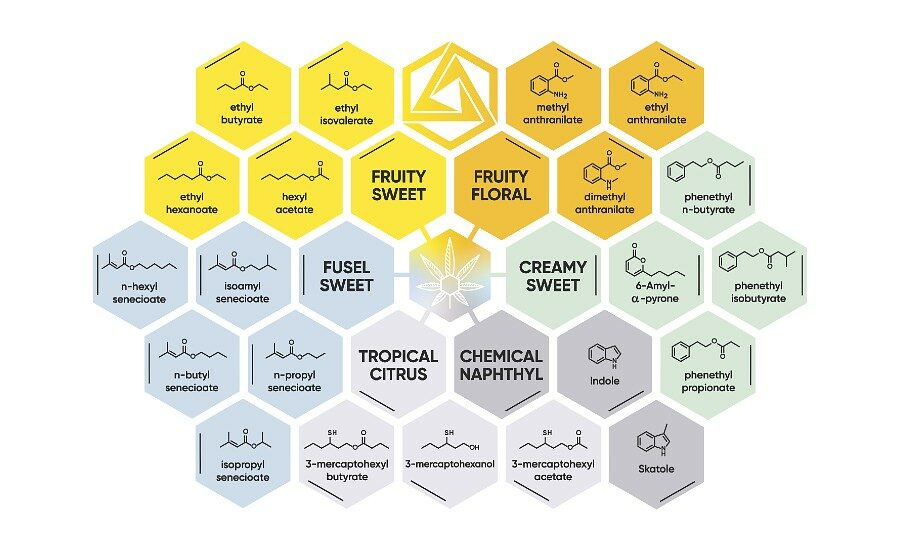
IMAGE CREDIT: Abstrax
Abstrax Research Unveils Cannabis Flavor and Aroma Compounds
Research suggests aroma is not only affected by terpenes
Abstrax, in collaboration with 710 Labs, SepSolve Analytical and Markes International, has uncovered new exotic flavor and aroma compounds in cannabis.
The study, published in ACS Omega, was selected as an ACS Editor’s Choice publication, highlighting the interest of this work.
"We found clear correlations between key minor compounds never before seen in cannabis that produce some of the most desireable aromas,” said TJ Martin, vice president of research and development at Abstrax. ”After analysis by our sensory panel, in tandem with our analytical data, it became evident that terpenes, while essential in producing many of the typical aromas in cannabis, do not necessarily differentiate many varieties with distinct scents.”
The research began with a human sensory panel that assessed the aroma of more than 30 different ice hash rosin samples. The results revealed differences between varieties, with some described as "sweet or fruity" and others as "savory or chemical."
The diversity of aromas provided researchers with a broad spectrum of legal cannabis product samples to analyze. Next, 2-dimensional gas chromatography, a technique offering higher resolution and fidelity than traditional chemical analysis methods, enabled the detection of compounds in small concentrations that can have a significant odor impact. This proved crucial when the team discovered that terpenes had minimal correlation with the highly sought after attributes of many exotic cannabis varieties, suggesting an alternative class of compounds could be the key.
The study identified key aroma classes with diverse functionality, each responsible for desirable aromatic qualities found in modern cannabis. Abstrax scientists highlight two classes, including tropical Volatile Sulfur Compounds (VSCs) and the heterocyclic compounds indole and skatole. The former produce highly desired exotic citrus and tropical notes in certain varieties such as Tangie or Tropicana Cookies, while the latter provide a rich, intense, chemical scent in GMO, 710 Chem, and other savory varieties.
Citrus is currently a very important trend in flavor science, with many brands working to engineer citrus alternatives. With the discovery of the compounds responsible for the iconic Tangie flavor and aroma, known as “tropicannasulfurs,” other industries can leverage these unique compounds to create extremely unique and desirable citrus aromas.
Furthermore, a broad variety of flavorants in cannabis including esters, alcohols, ketones and more that contribute to the berry, tropical, candy, fruity, strawberry, pineapple, and other sweet notes were identified. These flavorants play a role in exotic varieties like Apple Fritter, Zkittlez, Gelato and Runtz. While found in small amounts, these compounds combine to create many of the diverse sweet or fruity notes in modern cannabis.
“The discovery of these compounds will play a role in validating cannabis’ authenticity and accurately classifying cannabis varieties in the future,” said Max Koby, CEO and co-founder of Abstrax. “It also enables Abstrax to create the most flavorful and authentic cannabis flavors utilizing these previously undiscovered cannabis compounds. This research is important for consumers, researchers, brands, cultivators, labs, regulators and everyone in between.”
For example, Gorilla Glue, which typically has a pungent, gassy, almost chemical scent, was described as tropical and citrus by the sensory panel. Chemical data validated the sensory results, showing high concentrations of tropical VSCs (tropicannasulfurs), suggesting that the product was mislabeled. These compounds offer a means to correctly classify varieties and ensure product quality and authenticity.
"Abstrax and 710 Labs share the same lifelong passion: studying this incredibly complex plant,” said Brad Melshenker, co-CEO of 710 Labs. “This research helps us better understand flavor in the cannabis experience, allowing us to better educate our customers and select phenos for our genetic library."
These findings are especially important for:
- Consumers to best identify and understand the products they love.
- Cultivators/breeders to hone in on creating unique genetics and highly consistent products.
- Packaging experts to better innovate for specific compounds to increase product shelf life.
- Regulators to fully understand which components of a cannabis plant are driving sweet, fruity, and savory flavors and aromas.
Beyond gaining a better understanding of the aromatic qualities of cannabis, the authors hope that other functional applications may follow.
"Cannabis is used medically for many health ailments, but there are so many questions remaining as to how it works and if we can enhance those properties by creating new varieties with specific chemistries," said Iain Oswald, PhD, Abstrax principal research scientist. “We hope our work will open new avenues of research for others to better understand this unique plant and harness its full therapeutic potential.”
For instance, indole and skatole, two of the key savory and chemical aroma compounds discovered in the study, contain similar chemical structures to 3-3′-Diindolylmethane (DIM), which is a weak CB1 and CB2 receptor agonist that has shown antiproliferative properties in certain cancer cell lines. Now researchers can investigate if either indole or skatole may contribute similar functionality to cannabis.
“This new chemistry will open the doors for exciting new avenues of research and classification schemes that are grounded in the very thing that makes so many cannabis varieties unique — their aroma,” says Kevin Koby, chief science officer of Abstrax. “While this research may answer many questions, it opens just as many new possibilities for this incredible plant.”
The study is soon to result in the publication of four key white papers to help simplify these results for a general audience: (1) exploring exotic flavor compounds, (2) Tangies’ unique tropical VSC, (3) a deep dive unveiling GMO, and (4) an exploration on the sugar and sweet compounds in cannabis.
Check out this recent story: Abstrax, Weedmaps partner on educational content.
